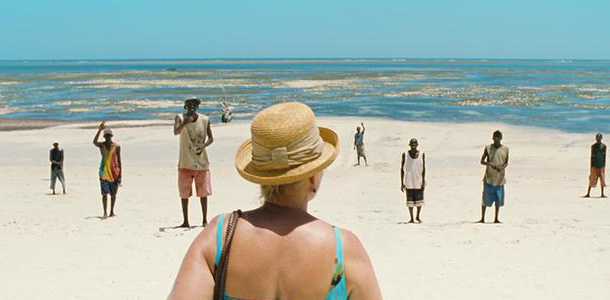Seidl Pads out his Humanist/Colonialist Fairytale a bit too Thinly
The film follows Teresa, a 50 year-old Austrian mother of a bratty teen who takes an extended vacation alone to a resort on a Kenyan coast. Resembling the exact ideal of what one would imagine a paradise on Earth to be, the beaches are cleanly segregated between the middle-aged bourgeoisie vacationers and loitering locals waiting to sell the wealthy visitors their craft. Teresa, single and yearning for a meaningful love affair, decides to take advantage of the too-good-to-be-true seductions by the young, hung Kenyan charmers. As reality sets in, it becomes clear that there is some intersubjective exploitation afoot, as both sides capitalize on the other’s weaknesses; Teresa’s being emotional, the locals’ being economic and social.
While the idea is strong, it isn’t sustained by the bloated running time. The film is never boring thanks to several great single-take scenes and, much more, Maragarethe Tiesel’s brilliant performance as Teresa, it feels padded out. For example, Teresa’s learning curve to realizing what the Kenyans are after from her is awkwardly stilted. One could chalk her gullibility to the self-deception of the desperately lovelorn, but there are carefully calculated steps to her increasing awareness, and it seems to stall toward the end as Step 3 of 4 gets repeated for some reason, adding nothing but wasted space. What does work, though, are scenes of Teresa alone with her dates, instructing the clearly uninterested men on how to behave as if they were actually into her. These bits are both hilarious and sorrowfully trenchant, and making the excess easier to swallow.
Aesthetics are certifiably Austrian, with little movement and precise compositions from Seidl’s longtime DP Wolfgang Thaler’s camera (plus help from Ed Lachmann); familiarity aside, this film is downright beautiful to look at. Sparse editing gives Tiesel plenty of room to breathe as she just goes and goes and goes, saying her lines like a woman who’s lived it; specific concept aside, the angsty themes surrounding the elusiveness of mid-life happiness are awfully universal, and they come through clearly to cringe-inducing effect. As if anyone were to be surprised (given the source), paradise this ain’t and love there is not.
2012 Cannes Film Festival – Main Competition
120 Mins
